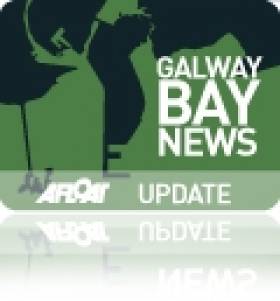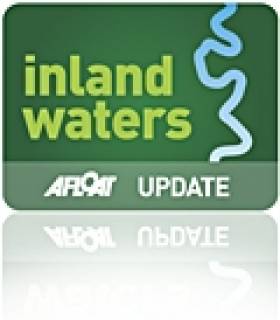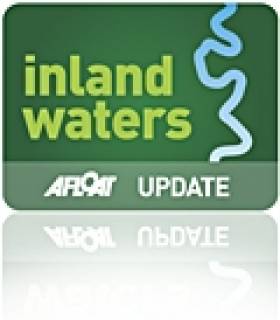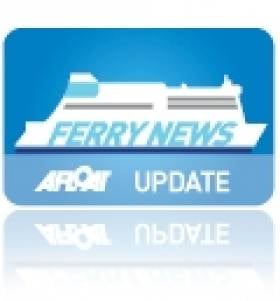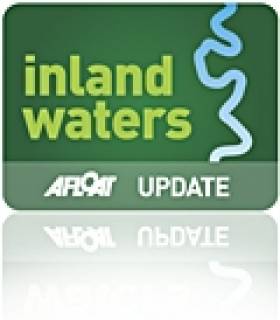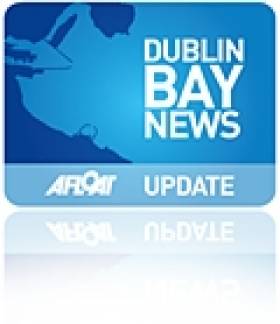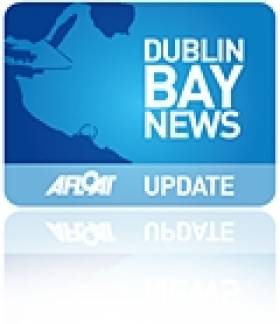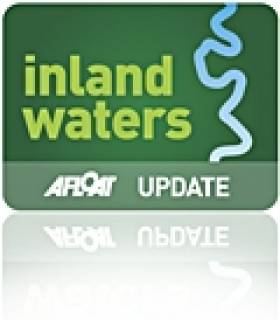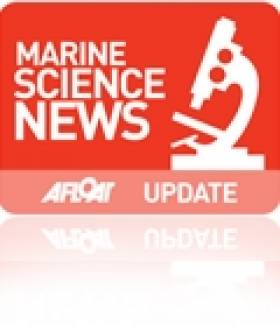Displaying items by tag: project
#GALWAY HARBOUR - Galway Harbour management are looking forward to the prospect of Chinese investment in the port's redevelopment plans, the Galway Independent reports.
“Chinese investors clearly recognise not only the massive potential of ocean tourism, but also the specific potential for Galway as a destination port for cruise liners," said Fine Gael TD Brian Walsh, referring to discussions between the Government and Chinese officials in Beijing last week.
As previously reported on Afloat.ie, Galway Bay can expect to welcome at least nine cruise visits thus year, with the first scheduled to arrive late next month.
Walsh added: "Galway is an incredibly attractive city, and if we can make it accessible to the major players in the cruise-line market, the impact on the local economy would be immense.”
Galway Harbour Company CEO Eamon Bradshaw said that the port project had "illicited quite a bit of interest" when the company presented at the recent Chinese-Ireland Relations conference at NUI Galway.
"We’re confident that we do have a lot to offer and we are confident that an investor will come on board."
The Galway Independent has more on the story HERE.
Environment Award for NI Angling Club
#INLAND WATERWAYS - The Tyrone Times reports that Clogher and District Angling Club has been awarded £1,000 (€1,196) by the Northern Ireland Environment Agency (NIEA) for an environmental project with local schools.
The Water Environment Community Awards recognised the club for its work with St McCartan's Primary School in Clogher and Augher Central Primary School to "investigate the signs and impact of pollution in the River Blackwater" over the coming months.
“Clogher and District Angling Club have demonstrated their commitment to protecting and improving their local water environment," said the NIEA's Dave Foster.
"I hope that their efforts over the next few months will inspire others to do their bit too and I would urge people to follow these projects and share what they see.”
Minister Has Little to Report on Ulster Canal Project
#INLAND WATERWAYS - Three months on from Minister Jimmy Deenihan's statement on the Ulster Canal regeneration project, and there is little to update on its progress.
As reported on Afloat.ie last December, the Minister for Arts, Heritage and the Gaeltacht replied to a written question from Cork East Sinn Féin deputy Sandra McLennan that the project is "progressing'"despite a U-turn on Government funding, and confirmed that Waterways Ireland would solely fund the scheme from its annual allocations.
However, the minister's latest response - to a question from Cavan-Monaghan Sinn Féin TD Caoimhghín Ó Caoláin requesting an update on the project's progress - is almost identical to his previous statement.
One small difference is an acknowledgement that Cavan County Council has granted planning permission for the project, which involves restoration of the canal between Clones in Co Monaghan and Upper Lough Erne.
Minister Deenihan also stated that his department is "finalising terms of reference" for the proposed inter-agency group that would examine ways to further the project, but gave no timeframe as to when this group would be established.
#FERRY NEWS - A cross-border project to develop ferry services for island and remote communities of the Irish and Scottish coastlines has received funding in the sixth round of the European Regional Development Fund (EDRF).
A grant of £450,000 (€540,000) has been allocated to procure the world's first ever hybrid RORO ferry for operation in Scotland, following the completion of the INTERREG funded Small Ferries Project.
The project - a cross-border partnership between Caledonian Maritime Assets Limited and administrations in Ireland and Northern Ireland - produced common designs and procurement strategies for a fleet of small ferries which could be used to serve remote coastal communities.
As previously reported on Afloat.ie, five Scottish coastal routes (and three Irish routes) were examined as part of the Small Ferries Project report published in September last year.
Arising from this, Scotland will see the next step in the project by hosting the world’s first hybrid RORO ferry, designed for use on short crossing routes around the Clyde esturary and Hebrides.
The EDRF funding will also be used to develop the corresponding shore infrastructure to enable the ferry to recharge in port.
The first vessel is expected to enter service in Spring 2013.
Ulster Canal Project 'Progressing' Despite U-Turn on Govt Funds
#INLAND WATERWAYS - The Ulster Canal restoration project will be funded by Waterways Ireland alone, at least for the time being, according to the Minister for Arts, Heritage and the Gaeltacht.
Responding in the Dáil to a written question from Cork East Sinn Féin deputy Sandra McLennan, Minister Jimmy Deenihan said that while the previous Government had committed in 2007 to covering the full capital costs of the project, estimated at €35 million, such was no longer viable in the current climate.
"Government accounting procedures do not provide, in that sense, for the ’ring-fencing’ of funds for projects of this nature," said the minister, who added that he was "advised that it was always the intention that the Ulster Canal project would be funded from the Waterways Ireland annual allocations" as well as "projected income from the commercialisation of certain Waterways Ireland assets", though he admitted this had been affected negatively by the economic downturn.
However, Minister Deenihan noted that the project - involving restoration of the canal between Clones in Co Monaghan and Upper Lough Erne - is "progressing incrementally" and that a planning application submitted in October was a "significant milestone".
He also confirmed that he intends "to continue to explore all possible options that may assist in the advancement of this project", which may involve an inter-agency group between the relevant county councils and interested bodies to examine ways of advancing the scheme.
Dun Laoghaire Diaspora Centre Seeks Funding
Dun Laoghaire's planned new diaspora centre will rival the likes of Sydney Opera House, according to the semi-state body behind the proposal.
Dun Laoghaire Harbour Company estimates the cost of the project at €50 million. Most of this will come from EU and State funding, but some €15 million in donations will be required for the scheme to go ahead.
It's expected that this money will come from corporate donors and private investors, both at home and among the diaspora.
Discussions have also begun with a view to twinning the centre with the Ellis Island memorial in New York.
The diaspora centre would directly provide 200 jobs in Dun Laoghaire, which hopes to begin welcoming the latest breed of cruise liners to the harbour next year.
€220m for 9km Pipeline to Cut Dublin Bay Pollution
Dublin City Council is proposing a mammoth 9km sewage outfall pipe to help make Dublin Bay cleaner - at a cost of €220m.
Herald.ie reports that the 5m-wide pipe - longer than the Dublin Port Tunnel - would dump effluent from the Ringsend treatment plant far offshore, thereby avoiding pollution in the bay and sensitive areas such as Bull Island, which recently lost its EU Blue Flag status for Dollymount Strand.
Plans for the project, which DCC head of waste Pat Cronin described as the "greenest and most economic solution" will be open to public consultation in the near future, with a timetable for completion by 2015.
The pipeline and redeveloped treatment plant will be funded via the Department of the Environment's water services investment programme.
Ministers Welcome EU Partners on Inland Waters Initiative
Minister Jimmy Deenihan TD Dept of Arts, Heritage and the Gaeltacht (DAHG) and Minister Carál Ní Chuilín, MLA, Department of Culture, Arts and Leisure(DCAL) met delegates from 12 EU countries, Norway and Serbia at a dinner this evening in Dublin Castle to mark the Waterways Forward Masterclasses taking place in Dublin and Enniskillen on the 14th and 15th September.
Facilitated by Waterways Ireland the Masterclasses take place as part of the Waterways Forward INTERREG IVC Project. The Waterways Forward project is focused on the 'enhancement of the management and the boosting of socio-economic development of regional inland waterways and their adjacent waterways' right across Europe.
Department of Arts, Heritage and the Gaeltacht Minister Jimmy Deenihan, T.D, stated
"The future of the waterways both in Ireland and other countries is of huge importance to the economy of all Europe. The meeting is dealing with difficult subjects and I am looking forward to receiving the conference recommendations for an enhanced use and management of the inland waterways for the benefits of all involved."
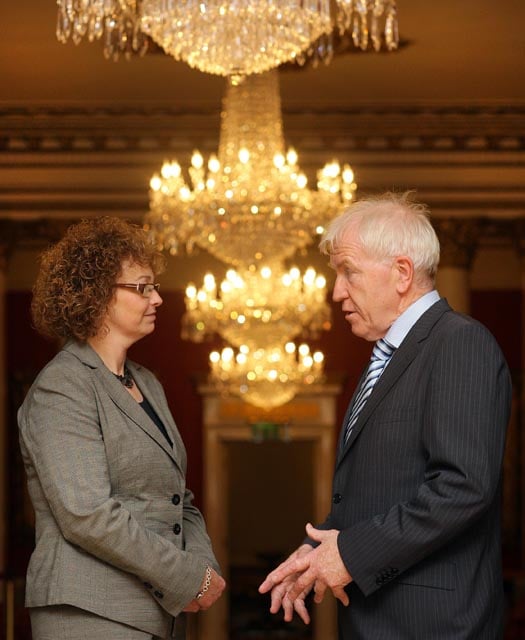
Carál Ní Chuilín Minister for Culture, Arts and Leisure in the Northern Assembly and Jimmy Deenihan TD Minister for Arts, Heritage and the Gaeltacht pictured speaking at the 4th Interregional meeting of the Waterways forward group at Dublin Castle last night Photo: Marc O'Sullivan
Department of Culture, Arts and Leisure Minister, Carál Ní Chuilín, said: "Ireland has some of the most impressive waterways on offer. From the Grand Canal in Dublin to Lough Erne in Enniskillen, Inland waterways have the potential to better connect the economic structures on this island. In the current economic climate such connections can only impact positively on increasing the contribution made by this sector to the all-island economy. The diversity of our waterways and the work being carried out by Waterways Ireland will not fail to impress. This conference will allow Waterways Ireland to plan in a strategic way for future investment in the waterways to improve their navigational, recreation and tourism potential for the benefit of all waterway users."
The Masterclasses will address issues around the sustainable development of inland waterways and the potential impact of climate change on regional inland waterways across Europe.
Lead by the Dutch Recreational Waterways Foundation, the INTERREG IVC Project runs from January 2010 to December 2012 and has a total budget of just over €2.8 million. The Masterclasses are one of a series of meetings, conferences and research projects being undertaken by the partners with the aim of sharing best practice, developing integrated, tailor made governance structures & models and facilitating increased cooperation at EU level.
US Schools Send Mini Sailboats Across The Pond
Mini sailboats could soon be spotted in Irish waters if a US school project goes according to plan.
The Bangor Daily News in Maine reports on the Educational Passages programme, through which middle school students will equip miniature sailboats with GPS trackers and set them out to sea to follow their progress across the Atlantic.
In previous years the programme - which is designed to give youngsters hands-on experience in maritime professions and skills such as oceanography and chart reading - has sent its self-steering boats as far as Portugal.
This year's students are hoping to catch the Gulf Stream to send their boats to Europe. The boats will be launched by trainees on the Maine Maritime Academy's training vessel State of Maine, which will also be retrieving a boat from a previous project that was recovered in Ireland.


























